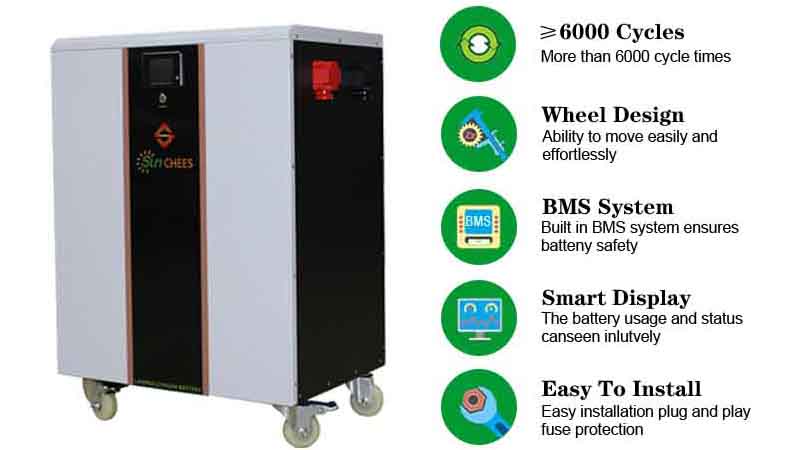Which battery is the best choice for solar photovoltaic energy storage system? What are the advantages and disadvantages of different batteries? Sunchees will analyze various types of batteries for you, and you will definitely make your own choice after reading it.
1、Lithium-ion battery
Lithium batteries are the mainstream choice for solar energy storage systems. Lithium batteries are high-energy-density batteries that are suitable for home and commercial systems. The number of cycles can reach more than 6,000 times. They are highly efficient, with a charging and discharging efficiency of more than 92%. They can effectively reduce energy loss and do not require regular maintenance. They are usually equipped with a battery management system (BMS). Long-term use of solar energy storage lithium batteries is a cost-effective option, with a high initial cost. Lithium batteries can be used for home energy storage, industrial and commercial energy storage, off-grid systems, and grid-connected systems. Lithium iron phosphate batteries (LFP) are preferred for safety and efficiency, as well as ternary lithium (NMC).

2、Lead-acid batteries
Lead-acid batteries are an older solar system configuration battery solution. They are relatively cheap and easy to recycle, but they have a very short lifespan, with only 300-500 cycles. The charging and discharging efficiency is about 75%, which is relatively inefficient and needs to be replaced frequently. They are suitable for off-grid systems or backup power sources with a very low budget.
3、Flow Battery
Liquid flow batteries have independent designs for power and capacity, are suitable for megawatt projects, have a cycle count of more than 15,000 times, have an ultra-long life, are suitable for daily charging and discharging, have no risk of combustion, are highly safe, and have a relatively high price. Liquid flow batteries can be considered for grid-level solar energy storage and high-power energy storage systems
4、Sodium-sulfur battery
Sodium-sulfur batteries are high-temperature batteries suitable for large-scale applications. They need to be operated at 300°C and are relatively complex to maintain.
5、Solid-state batteries
Solid-state batteries have higher energy density and safety, but their current cost is extremely high and the technology is not yet mature. They are potential batteries in the future energy storage market.
Recommended choice
In general, lithium batteries are the best choice for home and small- and medium-sized solar energy storage systems based on cycle life, cost, and adaptability. If the budget is limited and regular maintenance is possible, lead-acid batteries are also an option. For large projects or grid energy storage projects, flow batteries or lithium batteries are more recommended.